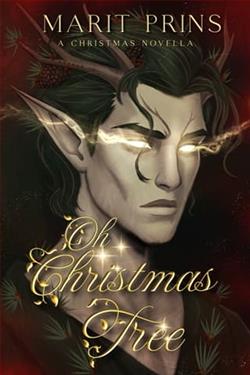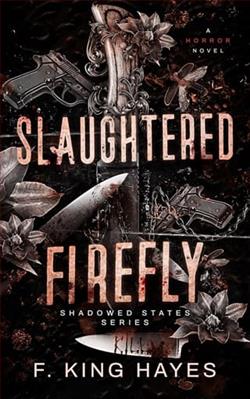Page 91 of The Witch of Cologne
Ruth grabs it. ‘Abba! They will kill you!’
Standing against a horizon bloody with flame, Elazar smiles calmly. ‘Nonsense, child. I must be with my people. The burning word is calling me.’
Before Detlef can once again attempt to drag him back to safety, a boy at the edge of the rabble turns at the old man’s voice.
‘Look! It’s one of them! One of their devil worshippers!’
Several youths swing around, stunned for a second at the sight of the old rabbi standing erect, slowly lifting his kittel above his head and advancing upon the horde.
‘Behold the wrath of Moses, for he shall come amongst you and strike down all whose hands are awash with the blood of the children of Israel…’
‘Sure, old man! We’ll part for you like the Red Sea itself!’ they jeer, moving aside to let the rabbi walk between them towards the burning synagogue.
‘Your sons and their sons shall wear the wrath of the Israelites upon their foreheads. It shall be a flaming brand for all to see,’ Elazar continues as he walks fearlessly down the opened pathway strewn with broken glass, smoking embers, pieces of smouldering cloth.
He reaches the old oak door and pushes against it with one hand. It falls flat, creating a wooden bridge into the temple. The crowd falls silent as the rabbi steps onto the burning door.
Swinging around, he faces them. ‘Hear O Israel, the Lord our God, the Lord is one! For my children are the children of God, they shall rise from the ashes and sing with the wind. And there shall be a Paradise and in it we shall all be free!’
Several of the young men turn from his fiery gaze. One crosses himself. Another drops to his knees. Elazar spreads his hands wide in the silence, his body a crucifix against the flaming building. He begins to sing Kaddish then turns and walks into the blazing temple.
They shelter in a ditch, the dried-up bed of what was once a creek. Above them an awning of tree branches engraves the black sky. A light wind brings the faint barking of dogs but there are no church bells, no town crier, no night birds, not even the owls. Ruth is lying beside him, her body rigid, her face dirty with soot, staring up at the stars. She has been like this for hours.
‘Ruth,’ Detlef whispers. ‘Ruth…’
Her eyes, in a face criss-crossed by moonlight and shadow, flicker.
‘Come back to me.’
He glances in the direction she is gazing and wonders whether the woman he knows still lives in this shattered heap of fear and bone. Here, pressed against the twigs and sandy soil, he can feel them dwindling into nothing. Without status, without civilisation, just two tiny figures stretched against the surface of a tumbling world. Free-falling through the great velvet chasm.
Her mute face squeezes his heart until, after a century of silence, he wonders whether they will ever speak again. Shivering, he pulls her stiff body closer. Just as he is about to drift into sleep, he feels her reach up, touching his cheeks, his nose, his lips. Like a blind woman. Like a woman who, after a long absence, is spellbound by her lover’s features and searches for the memory of him with her fingertips. And it is then that this silent woman, this broken hollowed spiritcreature he barely recognises, covers his body with hers, runs her tongue over his eyelids as if trying to wash away the image of this terrible day. Daring not to breathe nor to move, Detlef lies like a child. Waiting.
She draws his hands up to her breasts, warm under the rough cloth. Surprised by their heaviness he pushes her robe from her shoulders then touches her again in wonder; the nipples are far darker and larger than he remembers. She guides him down to her belly. His large hands draw the arc down to the hollow of her thighs then back up again. Amazed, he sits up and lays her gently down on her back, his eyes straining in the dark as he peers more closely at her body.
‘You are with child?’
She nods.
Astonished, he lays his cheek against the soft downy skin, cool to his burning ear. In all of this destruction, his seed, a new life. It is a miracle to him, a thread of dream against desolation. He presses his lips against the curved flesh, tracing with his hand the fine feathers of black hair growing down from her navel. Her vulva is swollen, the lips swelling beneath his touch, the bead of pleasure growing hard, pushing against his thumb. He parts her legs and lowers his mouth between them, then gazes up in wonder at the arched horizon of her womb above him. Running his fingers slowly across, he plays her until he hears her groan, then takes her into his mouth, caressing her over and over until her hips writhe under his hands. Only then does he lift himself up above her and enter her with the rushing ecstasy again and again until their shouts swallow the stars and the pain and the burning smoke and for a brief moment they forget their mortality and all that has gone before.
– NETZACH –
Victory
Das Wolkenhaus, Late Winter, 1666
Ruth sits at the virginal feeling the music pulsate through her fingers. Her feet pump in rhythm as the thin sound tries to fill the echoing chamber. Her embroidered shawl is draped over her shoulders and hangs below her womb which is full and round under the black muslin skirt. The piece she is playing is a romantic work from the Parthenia collection. As she searches for the notes she recalls her mother playing this particular passage over and over again, the forlorn prelude bringing back the earlier time so vividly that the image of Sara sitting in the front room in Deutz appears before her, the figure upright and visibly pregnant. It is as if the sensation of the child within the midwife has its own memory that stretches back through time, through the tissues of the body itself, from daughter to mother to mother.
Ruth, fascinated by this notion, turns it over in her mind as she plays on. E, G, C sharp, F. It distracts her, and diversion is the opium she craves during this endless autumn and winter when she has been confined to Detlef’s country retreat. He has been gone for one long week, returned to Cologne to attend to his clerical duties. It is these separations that Ruth has begun to find increasingly difficult.
She changes the tune to a vigorous ditty. She cannot bear silence any more than she can tolerate reflection. Reflection means thinking and that means descending into a terrain that is utterly barren: a landscape which was once fecund with hope is now a graveyard, devoid of intellect, belief, humanity.
At night Ruth rocks herself for hours to hold back the deluge of grief that is ever present, and there is nothing Detlef can do or say. Sometimes she feels like an insect trapped in amber, paralysed, all emotion suspended, looking up through the thick golden crystal while the heartbeat of her unborn baby drums on relentlessly.
She lays her hands over her womb. This child, she thinks, our child, conceived in love, a miracle, all the more so for its ordinariness. You shall be all to me, she tells the child within, the crystallisation of her father, a living manifestation of her affection for Detlef. The only future they have.
Then, fearing a draught, she pulls her shawl tighter around herself.















